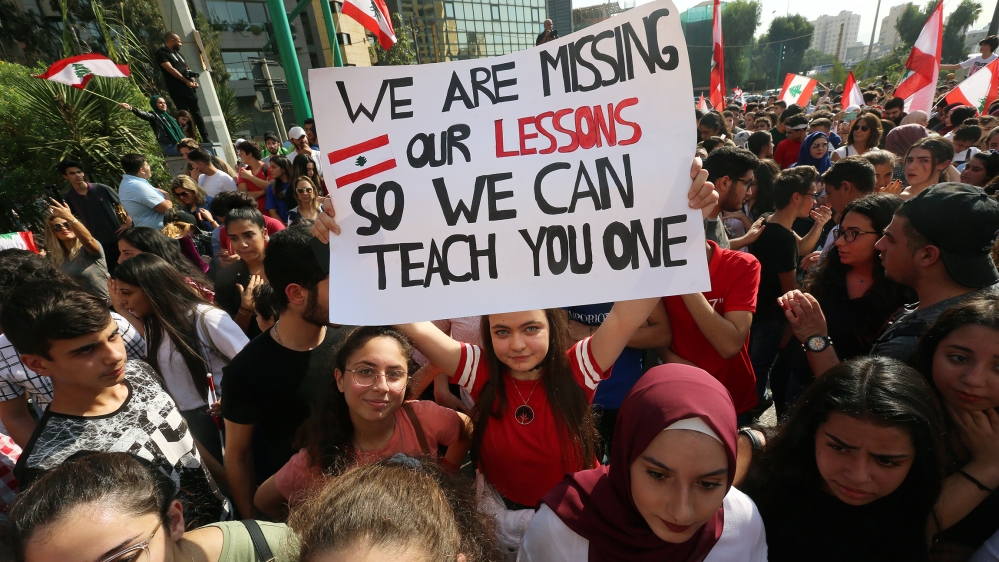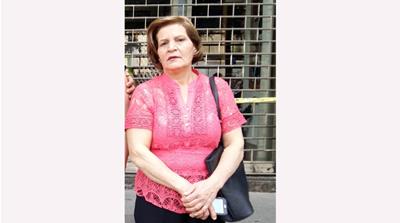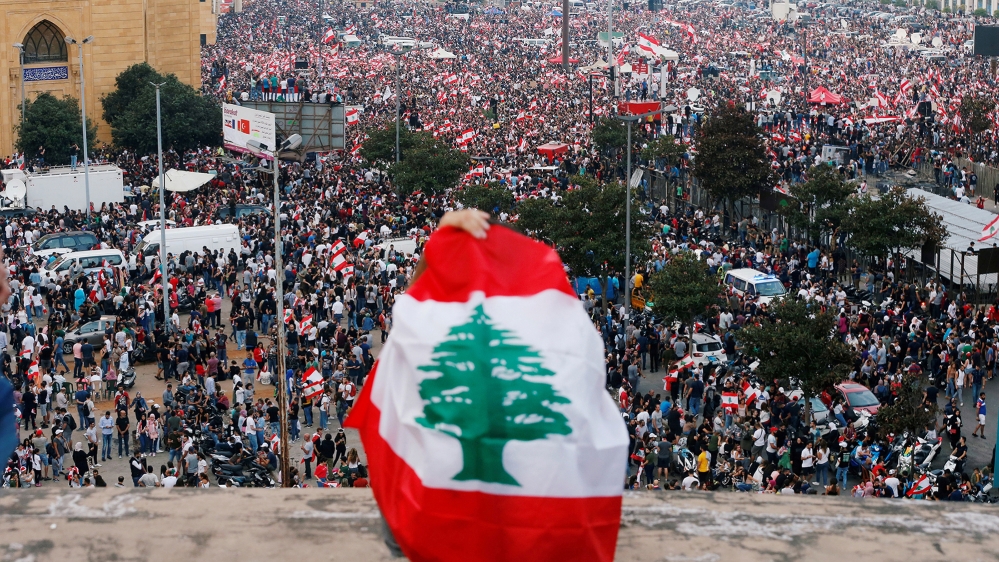Older Lebanese wary as anti-government protests at a stalemate
More than a month after protesters took to the streets in Lebanon, some older people worry about what happens next.

Beirut, Lebanon – Ibrahim Srour left Lebanon once before. In 1986, after a decade of war, he packed his bags for the United States. He finally returned home 20 years later.
Born in 1948, five years after the country’s independence, Srour has experienced most of Lebanese history first-hand. Amid the youthful hope of the weeks-long uprising against Lebanon’s political elite, Srour says he is terrified.
Keep reading
list of 3 items‘Revolution fist’, symbol of Lebanon’s uprising, set alight
Will a new government end unrest in Lebanon?
“This country has been volatile for so many years, and these protests can go in all kinds of directions,” he said.
The 72-year-old believes Lebanon has to change. He supports the protests and admires those in the streets, who are demanding that politicians be held accountable for decades of economic mismanagement and alleged corruption, as well as an overhaul of the country’s political system, where power is apportioned between ethnic and religious groups. The protesters have also called for the appointment of technocratic government of experts to tackle the country’s economic crisis and provide widespread access to basic services such as water and electricity.
Demonstrators across the country have blocked roads and prevented parliament from sitting, while schools and banks have closed amid strikes and walkouts. But more than one month into the demonstrations, Srour sees dangerous signs: a deteriorating economy, lack of organisation among the protesters, and an entrenched elite that appears unwilling to cede power.

“Those corrupt people are very, very clever at creating divisions to keep control,” he said. “During the [1975-90] war, the people who wanted control fomented conflict. One day it was Muslim against Christian, the next day it was leftists against rightists, the next day it was Christian against Christian and Muslim against Muslim.”
“I am not religious, but I had to be Christian because otherwise I would be killed,” he added.
Srour said the situation today is very different from 1975. He sees more unity beyond sect and a greater idealism that political change can be achieved. But his life experience makes him more sensitive to the threat of destabilisation.
Youth-led movement
Young people, including students, have been hailed for leading the uprising, which first erupted on October 17 over proposed tax increases. With a youth unemployment rate of 37 percent, according to a 2017 Information International report, young people have both the time and the motivation to demonstrate. While many older people also support political change and have taken part in demonstrations, older generations appear to have become more cautious as the protests have continued.
Whether it is the newfound hurdles to daily life and businesses; the longer-term threats of bank, school and hospital closures; their criticisms of the protesters’ demands and organisation; or the trauma of past life experience, a sense of dread has come to permeate the movement’s hope.

Lebanese American University political science professor Sami Baroudi, 58, sees a clear generational divide in terms of enthusiasm for the continuing demonstrations. He told Al Jazeera the political system has failed everyone but that those below the age of 40 had been affected the most. While he supports the aims of the protesters, he was sceptical about what they would achieve
“I see more instability creeping into the system,” he said. “And I don’t see a civil, polite, way out of the economic impasse the country is facing.”
A month before the uprising, Lebanon – the world’s third most indebted country with the highest debt-to-GDP ratio – faced shortages of dollars at ATMs and a devaluation of its currency. Bank employee strikes during the protests led to bank closures and a rush to withdraw and transfer money when they reopened.
The value of Lebanon’s currency has plunged since demonstrations began. While the Lebanese pound is officially pegged at 1,507 to the US dollar, its black market rate has risen to more than 1,900 per dollar.
In recent weeks, the protests have also seen more clashes between demonstrators and security forces, as well as supporters of political factions. A protester was shot dead by a soldier on November 12, while followers of Hezbollah and Amal Movement have attacked demonstrators and protest sites on multiple occasions, including on consecutive nights this week.

Josette Nader, 64, visited her son Fadi at the hospital on November 14 after he was injured in clashes with police as they were unblocking roads.
“The moment I saw him, I started sobbing,” she said. “I told him I want him to stop revolting. But he went back to the streets.”
Nader has not spoken to her son since. She said she cannot bear to – she remembers protesters blocking roads in 1975.

She knows her son’s difficulties, that members of his generation cannot afford a decent apartment. Yet she is frustrated he does not take her memories seriously.
“Nobody’s understanding me,” Nader said. “But all I can think about these days is when we used to go back from one bunker to the other to hide.”
‘No consensus on reforms’
The young protesters have shorter memories, having grown up with the cast of militia leaders-turned-politicians entrenched in power since the civil war ended.
These rooted elites, despite their divisions, have not shaken easily. Since Prime Minister Saad Hariri resigned on October 29, the ruling class has slowly deliberated a solution to the crisis, finding little consensus.
In short, the protests have reached a stalemate, which Baroudi says is cause for concern.
“The longer the stalemate lingers,” he said, “the more pressure will be on the economy. The longer people stay in the street, the more the chances of friction emerging, the more chances of certain acts of rioting, especially if the current government remains.”
Before resigning, Hariri’s government presented a list of economic reform plans designed to improve state finances, appease the protesters and secure the release of pledged foreign aid. The plans included cuts to salaries of senior officials and the abolition of some state institutions. The plans also marked millions of dollars to be distributed to families living in poverty and tens of millions of dollars for housing loans.
Protesters rejected the proposals as too little, too late.
Baroudi is one of many analysts who sees contradictions in both Hariri’s proposals and in the demands of protesters, who are variously calling for government spending measures to boost social services and spending cuts to prevent currency collapse.
Hasan Youness, a 35-year-old professor of international business at Notre Dame University, said these proposals are incompatible.
“There are totally different perspectives regarding the economic reforms,” he said. “There is no consensus on a package of reforms which we can ask from the government.”
Srour said he thinks the youth have done a service highlighting all the country’s problems – yet he has not seen them present viable solutions, and does not think the leaderless movement has the proper organisation to do so.
Baroudi said there are no quick fixes to Lebanon’s chronic maladies. But one positive he sees is the scale and resilience of these demonstrations. There is no going back to a time before October 17, he said.

‘A bad state better than no state’
That is why 75-year-old Salwa Itani, despite having lived through all the tumults of Lebanon’s post-independence period, is still hopeful. She said she does not have any other choice: all 15 of her children currently live abroad because they lack opportunities in Lebanon.
“My son should not graduate from university and then have to work as a taxi driver,” she said. “People like him should be the ones ruling the country.”
Itani said she does not envisage the demonstrations devolving into wide-scale violence because she thinks the protesters are aware of Lebanon’s turbulent history and would not allow the movement to reach that point.
Baroudi’s memories lead him to a different conclusion, however. In 1975, he said, nobody expected the fighting to last as long as it did. He said they did not even call the conflict a war in the first few years – just “the events”.
“It was only later we realised that we had plunged ourselves into a civil war,” he said.
While Itani does not think any government could be as bad as the current one, Baroudi appreciates the relative stability provided by an elected government, compared with a potentially dangerous escalation.
“I have lived through a time when there was no state,” Baroudi said. “And despite all the failures of the state after 1990, even a bad state is better than no state.
“I fully understand that this generation lives under different kinds of pressures and pains, and I’m not saying that I’ve suffered more than them,” he continued. “But my memories have been shaped by the anarchic days of warlords.”